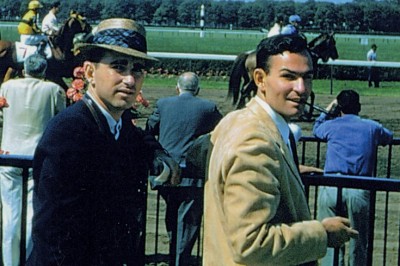| Reviews & Columns |
|
Reviews DVD TV on DVD Blu-ray 4K UHD International DVDs In Theaters Reviews by Studio Video Games Features Collector Series DVDs Easter Egg Database Interviews DVD Talk Radio Feature Articles Columns Anime Talk DVD Savant Horror DVDs The M.O.D. Squad Art House HD Talk Silent DVD
|
DVD Talk Forum |
|
|
| Resources |
|
DVD Price Search Customer Service #'s RCE Info Links |
|
Columns
|
|
|
Renée

Reviewed at the 2011 Tribeca Film Festival
And ESPN Films has done it again. Renée, as with the best films in their brilliant 30 for 30 series, is ostensibly a sports documentary, but it is about much more than the playing of a game. Director Eric Drath profiles Renée Richards, the female tennis contender who was revealed, in the summer of 1976, to have been born Richard Raskind. A doctor, father, and amateur tennis player, he underwent surgical sexual reassignment in 1975 and went on the women's circuit as Renée; she became a cause celebre when the U.S. Open refused to allow her to participate, insisting that she submit to chromosome testing. She ended up suing the United States Tennis Association, and won.
But it's not just the story of her fight to play tennis, or of the legal battle that gave her that right. Renée is all wrapped up in sexual identity and familial obligations, as well as the sexual politics of the 1970s and how media played into them. And it is a character study, of (warning: incoming understatement) a very complicated individual.
It is, for the most part, a fairly straight-on biographical documentary, tracing Renée/Richard back to the "crazy house" where he grew up, and where sex roles were immediately complicated by his sister Josephine, who dressed like a boy and told him he was a girl. He was very young when he started wearing his sister's clothing, but it was as a sneak, a private thrill; in public, he was a good Jewish boy, a popular, likable jock (proficient in both tennis and baseball, he was scouted by the Yankees), noted for his smoothness with the opposite sex.
The star athlete became a star surgeon, but his true nature was fighting to get out, and one of Drath's most absorbing passages details his first, awkward transition period--as friends and relatives were slowly becoming aware of the minor changes brought on by hormone injections, and found themselves unable to even guess at how to best react.
In that section and throughout the picture, Drath pops from one interview snippet to another, creating the quick, snappy rhythm that gives the film its pulse. It is a fast and often funny movie, but in its final third, it turns serious--and this is serious business. Drath wisely regards Renée's strained relationship with her son as a key to her emotional duress; five years after getting married and fathering Nicky, Renée then completed her transformation and fled to California to start her new life, ditching her young son in the process. "It doesn't get much more selfish than that," he says now, and he has a point, yes?
But he's also a mess on his own terms, unable to pay his rent or his bills, ticking off a series of failed careers and shipwrecked business ventures. How much responsibility does Richards have for how he's turned out? And how much does she feel? In an uncomfortable conversation between the two of them, Richards insists that she doesn't feel badly for her actions as a father, because she never stopped being one to him. But when she speaks of Nicky privately, she says--almost off-handedly--"Good thing I've got things to do... otherwise I'd feel like putting a bullet in my head."
Renée doesn't just see Renée Richards as a transgender hero, or a sports trailblazer, or (as a lesser film might have) a freak. It sees her as a complicated, confused, psychologically haphazard human being. It is interesting how, in these current interviews, Richards often speaks of herself in the third person. When we see a modern athlete doing that, we presume it's ego. With Richards, there's a good chance that she still doesn't know exactly who "Renée" is.
Jason lives in New York. He holds an MA in Cultural Reporting and Criticism from NYU.
|
| Popular Reviews |
| Sponsored Links |
|
|
| Sponsored Links |
|
|
| Release List | Reviews | Shop | Newsletter | Forum | DVD Giveaways | Blu-Ray | Advertise |
|
Copyright 2024 DVDTalk.com All Rights Reserved. Legal Info, Privacy Policy, Terms of Use,
Manage Preferences,
Your Privacy Choices | |||||||











